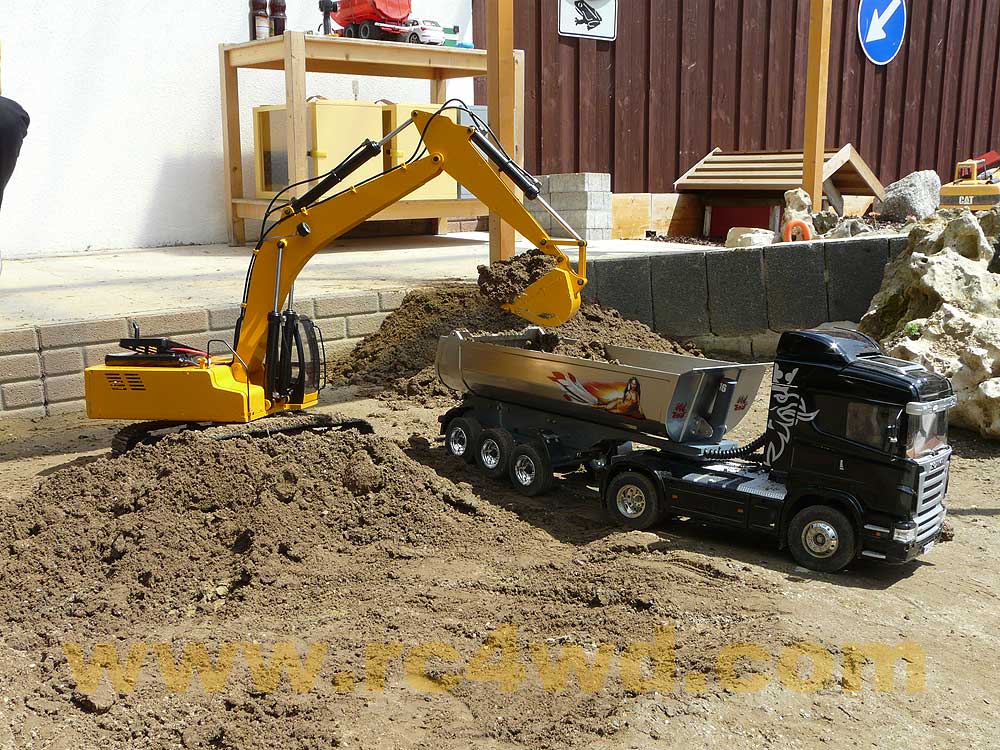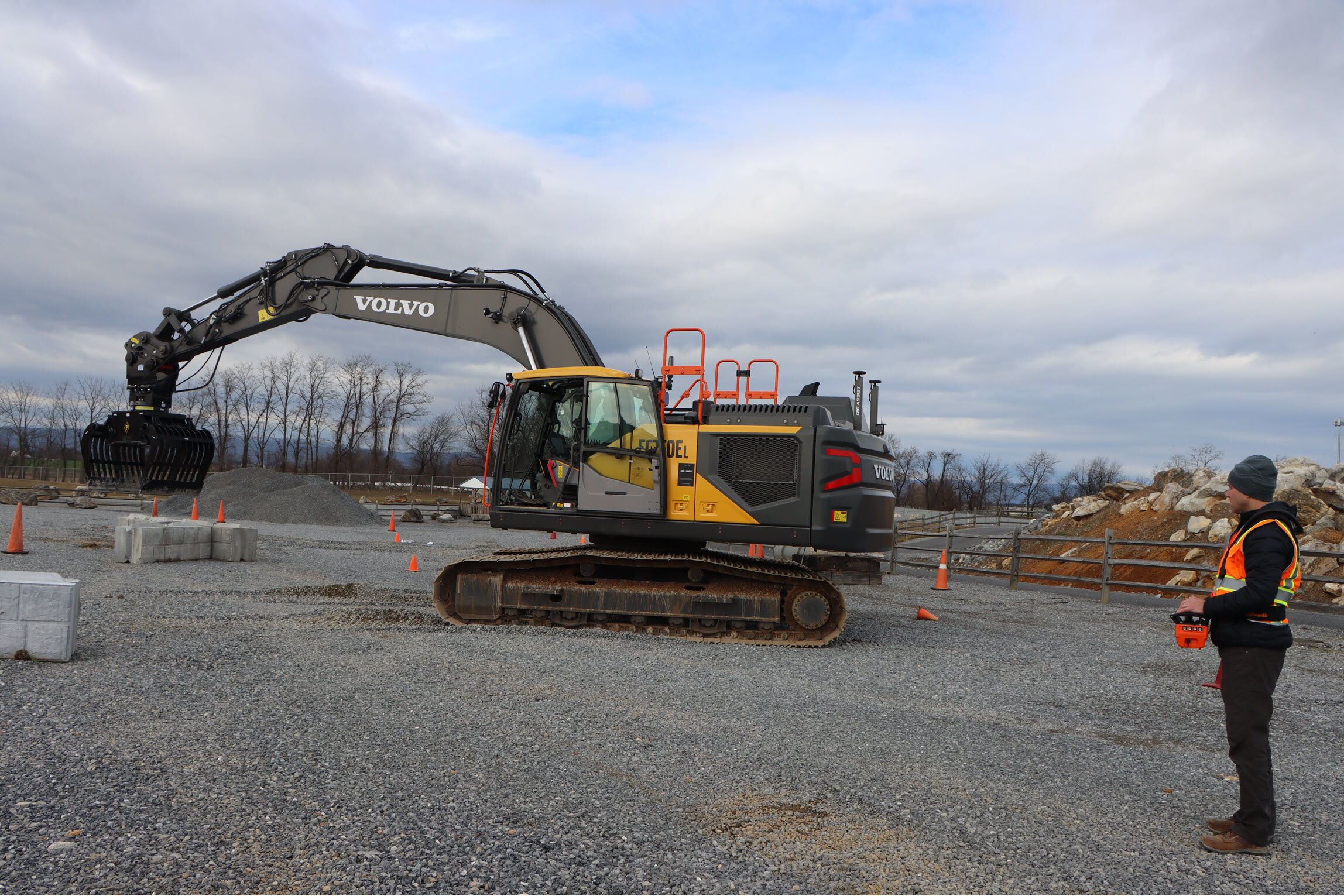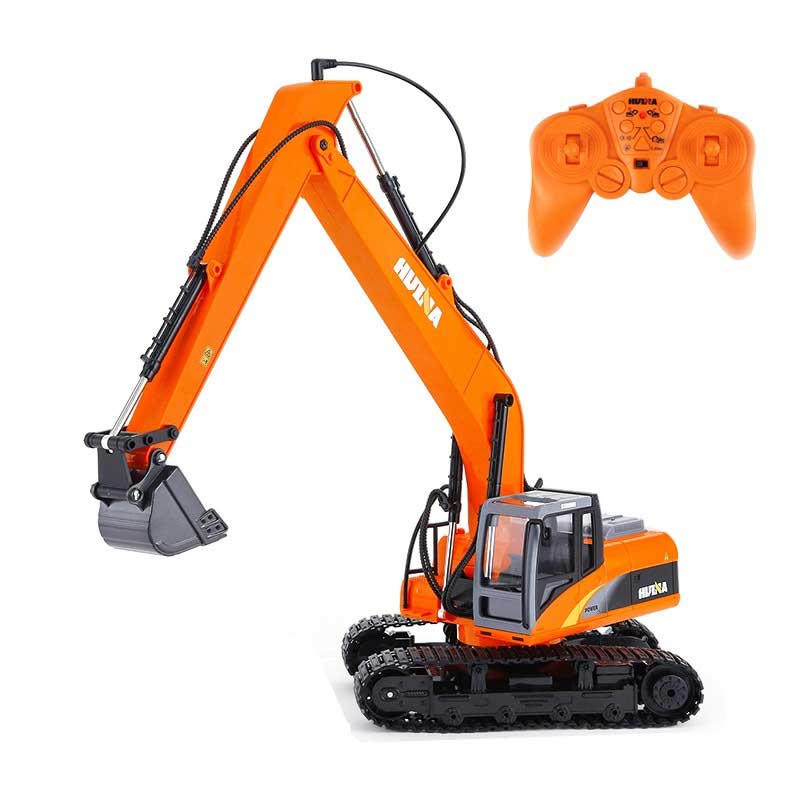Why a remote control excavator Is Crucial for Safety in High-Risk Demolition Tasks
Understanding Exactly How Excavator Functions and Its Effect on Performance
Excavators play a necessary role in building and construction and mining procedures, depending on a complex interaction of hydraulic and mechanical systems. Their capability to carry out a variety of jobs rests on both their style and the innovation integrated within. Understanding these parts can substantially impact functional effectiveness and productivity. As advancements remain to reshape the sector, one must take into consideration just how these modifications will affect future methods and efficiency.
The Essentials of Excavator Mechanics

The Role of Hydraulic Systems in Excavators
At the heart of excavator procedure lies the hydraulic system, which plays a pivotal function in powering the equipment's functions and movements. This system uses pressurized hydraulic liquid to transfer energy, making it possible for different actions such as excavating, training, and swinging. By taking advantage of the concepts of hydraulics, excavators can carry out jobs with impressive precision and pressure, boosting overall operational efficiency.The hydraulic system includes vital components, including cylinders, valves, and pumps, which interact to regulate the circulation and instructions of the liquid. When the driver engages the controls, the hydraulic liquid is directed to certain cylinders, translating the driver's commands right into physical activity. This system enables for receptive and smooth activities, which are necessary in building and excavation settings. double e volvo rc excavator. The efficiency of the hydraulic system directly affects the performance and adaptability of the excavator, making it a crucial component in modern excavation procedures
Trick Parts of an Excavator
Recognizing the crucial elements of an excavator is crucial for grasping exactly how this powerful device runs. An excavator includes several substantial components, including the undercarriage, residence, boom, arm, and pail. The undercarriage provides security and movement, typically including wheels or tracks to navigate different surfaces. The house has the engine and hydraulic systems, permitting the driver to manage motion and power the maker. The boom prolongs from your home, enabling vertical reach, while the arm connects to the bucket, facilitating digging and lifting operations.Additionally, the cab houses the operator, outfitted with controls for specific handling. Each of these elements plays an essential role in the excavator's total performance, adding to its efficiency and performance on building and construction websites. Understanding these components helps in preserving and optimizing excavator performance, guaranteeing tasks are finished safely and successfully.
Add-on Flexibility and Its Benefits
Accessory flexibility is a necessary facet of excavators, allowing operators to switch over between numerous tools tailored for details tasks. This adaptability not just enhances job effectiveness however also contributes to cost-effectiveness by lowering the requirement for numerous devices. Comprehending the various sorts of attachments available can substantially influence the total performance and capability of an excavator on task websites.
Kinds of Attachments
While excavators are primarily identified for their excavating capacities, their true convenience hinges on the vast variety of add-ons readily available. These add-ons improve the excavator's performance, allowing it to carry out various tasks beyond excavation. Common accessories consist of containers (for digging and scooping), hydraulic thumbs (for comprehending materials), and augers (for piercing holes) Grapples are made use of for handling and relocating debris, while rippers can separate hard surfaces. Other specialized add-ons, such as plates and rakes, enable excavators to adapt to details job demands. This diversity not only raises the equipment's utility across different fields, consisting of landscaping, building, and demolition, however additionally enables drivers to tailor their devices to meet details project needs effectively.
Boosted Task Effectiveness
Taking full advantage of work effectiveness is a main benefit of utilizing numerous excavator add-ons. Different attachments permit an excavator to perform several tasks without requiring to change equipment, saving valuable time and labor. For example, using a hydraulic hammer can damage concrete while a pail accessory can dig deep into soil, enabling a smooth workflow. This versatility lowers downtime connected with devices modifications and improves efficiency on-site. Additionally, specialized accessories boost precision in jobs such as grading or landscape design, leading to better end results. The ability to adapt to various work requirements not just simplifies procedures however also decreases the demand for additional machinery, making sure that tasks are finished quickly and successfully. In general, add-on convenience considerably adds to increased task performance in excavation job.
Cost-Effectiveness and Convenience
Cost-effectiveness is a significant advantage of making use of functional excavator attachments. These attachments permit a single excavator to carry out several tasks, lowering the demand for extra machinery and labor - double e volvo rc excavator. By switching in between buckets, hammers, and grapples, drivers can tackle different tasks, from digging to demolition, thereby making best use of devices use. This versatility not only reduces functional prices however likewise minimizes downtime related to altering devices. In addition, the ability to customize excavators with specialized my review here add-ons improves performance, as they can successfully manage diverse jobs according to project demands. To conclude, the mix of cost-effectiveness and versatility in excavator add-ons adds to improved operational effectiveness and source appropriation in building and construction and excavation projects

Advanced Innovation in Modern Excavators
Modern excavators are increasingly outfitted with sophisticated technology that transforms excavation procedures. Automation streamlines operations, while enhanced fuel efficiency lowers functional expenses. Furthermore, smart control systems enhance precision and safety, noting a significant development in excavation devices.
Automation in Excavation Processes
As excavation technology progresses, automation has emerged as a crucial part in enhancing efficiency and precision on task sites. Modern excavators are equipped with sophisticated automated systems that promote jobs such as grading, excavating, and trenching with very little operator treatment. These systems make use of sensors, GPS, and equipment learning algorithms to assure exact placing and deepness control, significantly minimizing the margin for mistake. Furthermore, automation allows drivers to concentrate on strategic decision-making instead of manual controls, leading to boosted performance overall. Such technologies not only simplify workflows yet also improve security by lessening human mistake in complex operations. Consequently, the assimilation of automation in excavation processes represents a significant development in building innovation, driving the market towards better effectiveness and effectiveness.
Improved Gas Performance
Developments in innovation have actually likewise resulted in considerable improvements in fuel effectiveness for modern excavators. Modern machines are equipped with innovative engines that maximize power outcome while minimizing gas consumption. These engines make use of ingenious combustion modern technologies, such as turbocharging and direct gas injection, to enhance efficiency and efficiency. Additionally, light-weight products in building and construction reduce total weight, enabling much less power expenditure during operation. The introduction of variable rate controls allows operators to readjust engine performance according to specific tasks, even more minimizing fuel use. As an outcome, these enhancements not just reduced functional expenses but also add to environmental sustainability by reducing discharges. On the whole, boosted gas efficiency in excavators is an important advancement that strengthens performance and financial practicality in the building industry.
Smart Control Equipment
While operators browse significantly intricate job sites, smart control systems in excavators have arised as important tools for improving performance and accuracy. These innovative innovations make use of sensing units and algorithms to keep track of numerous parameters such as load weight, surface conditions, and functional performance. By immediately readjusting hydraulic functions, wise systems enhance machine efficiency, causing boosted performance and decreased wear on components. In addition, operators profit from intuitive interfaces that offer real-time responses and diagnostics, enabling educated decision-making. This assimilation of technology not just streamlines operations yet likewise reduces human error, contributing to much safer job settings. As the building industry proceeds to develop, wise control systems will play a crucial function fit the future of excavator efficiency and efficiency.
Enhancing Operational Effectiveness With Excavators
Excavators play a crucial role in enhancing operational efficiency across numerous building and construction and excavation projects. Their versatility enables several pop over to this web-site jobs, consisting of lifting, product, and excavating handling, which enhances operations and minimizes the demand for additional tools. With powerful hydraulic systems, excavators can carry out durable jobs with accuracy, substantially decreasing the moment called for to full jobs. The assimilation look at this web-site of innovative modern technology, such as GPS and automated controls, better enhances their procedure, making it possible for operators to attain better precision and lower material waste. Additionally, contemporary excavators are developed to eat less gas and minimize emissions, adding to both expense savings and environmental sustainability. By using excavators properly, building and construction groups can improve performance, satisfy job due dates, and enhance total website monitoring. This multifunctionality and performance make excavators important devices in the contemporary construction landscape.
The Future of Excavators in Building and Mining Industries
As the construction and mining sectors develop, the future of excavators is positioned for significant transformation driven by technological advancement and changing functional demands. Breakthroughs in automation and man-made intelligence are improving excavator capacities, permitting improved accuracy and performance in procedures. Independent excavators are emerging, minimizing the requirement for human intervention and minimizing the danger of accidents.Moreover, the assimilation of telematics and IoT innovation allows real-time monitoring of maker performance and anticipating maintenance, maximizing uptime. Environment-friendly layouts, including hybrid and electric versions, are obtaining grip, straightening with sustainability objectives within the industry.Additionally, the use of innovative products and lighter designs enhances fuel performance while keeping performance criteria. As these patterns development, excavators will certainly play an important function in fulfilling the boosting demands for performance and security in building and mining, ultimately changing functional landscapes.
Often Asked Concerns
Exactly How Do Climate Problems Influence Excavator Performance?

Weather problems significantly affect excavator performance, as rain and mud can hinder grip and stability, while extreme temperature levels may affect hydraulic systems. Operators needs to adapt to these variables to assure perfect functionality and safety throughout procedures.
What Safety And Security Actions Should Operators Comply With While Making Use Of Excavators?
Security steps for excavator operators consist of putting on appropriate personal protective devices, conducting pre-operation evaluations, ensuring proper interaction with ground personnel, maintaining a safe distance from overhead dangers, and adhering to well-known functional methods to avoid crashes.
Exactly How Often Should Excavators Be Maintained for Optimum Performance?
Excavators need to be maintained frequently to guarantee peak performance, usually every 250 operating hours or as specified by the supplier. Regular checks enhance dependability, avoid unforeseen break downs, and expand the life-span of the equipment.
What Is the Average Lifespan of an Excavator?
The ordinary lifespan of an excavator usually ranges from 10,000 to 15,000 hours of procedure. Variables affecting long life include maintenance practices, running problems, and the quality of the maker itself, affecting general efficiency and efficiency.

Can Excavators Operate on Unequal Surface Successfully?
Excavators can run properly on uneven surface as a result of their articulated styles and flexible tracks. These features permit them to maintain stability and traction, enabling effective operation in challenging atmospheres typically come across in building and landscape design jobs. Each of these parts plays an essential role in the excavator's general performance, contributing to its effectiveness and effectiveness on building and construction sites. Making best use of task efficiency is a key advantage of making use of different excavator add-ons. While drivers browse progressively intricate work sites, clever control systems in excavators have arised as vital tools for boosting effectiveness and accuracy. Excavators play a crucial function in enhancing functional efficiency across numerous building and construction and excavation projects. Breakthroughs in automation and man-made intelligence are reshaping excavator abilities, permitting for improved accuracy and efficiency in operations.